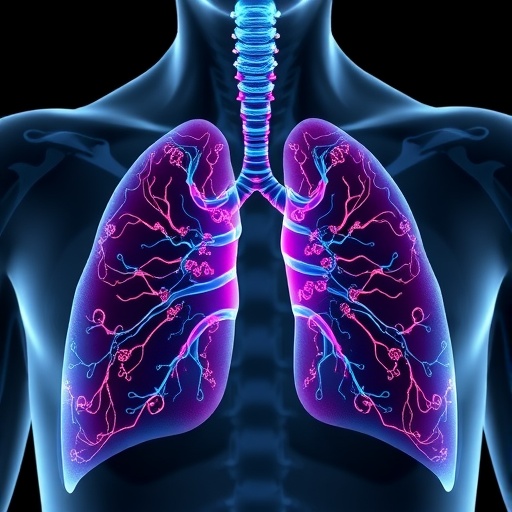Researchers in the field of respiratory medicine are embracing the potential of novel methodologies to uncover biomarkers that could revolutionize the understanding and treatment of idiopathic pulmonary fibrosis (IPF). A recent study led by a team of investigators including Cai, Zhang, and Li highlights the promising avenues of metabonomics-driven lipid profiling. This innovative approach aims not only to identify potential biomarkers for IPF but also to deepen insights into the underlying pathological mechanisms of this complex disease.
Idiopathic pulmonary fibrosis is characterized by progressive and irreversible scarring of the lung tissue, leading to significant morbidity and mortality. Despite advancements in our understanding of IPF, the etiology remains elusive, complicating the development of effective therapies. Traditional diagnostic approaches often rely on clinical, radiological, and histopathological findings, yet these methods may lack specificity. The integration of metabonomics offers a transformative potential for the early detection and monitoring of IPF by focusing on the metabolic changes that occur in affected individuals.
Through the application of advanced lipid profiling techniques, the authors of this study have generated compelling data illustrating the lipidomic alterations associated with IPF. Lipids serve as vital components of cellular membranes, signaling molecules, and energy storage entities. Their dysregulation can reflect the pathophysiological state of tissues, and in the context of IPF, these alterations could be indicative of disease progression or response to treatment. The research team meticulously analyzed various lipid metabolites in patient samples, aiming to correlate these with clinical outcomes.
The findings of this work underscore the importance of pursuing comprehensive metabolic analyses as a pathway to revealing hidden biomarkers. In a cohort of patients diagnosed with IPF, distinct lipid profiles were identified that correlate significantly with disease severity and progression. These metabolic signatures not only enhance our understanding of the biological processes underlying IPF but also open doors for the development of targeted therapeutic interventions based on lipidomic profiles.
Interestingly, lipidomic analysis may extend beyond the mere identification of biomarkers; it could guide future investigations into the mechanistic pathways involved in fibrosis development. By deciphering the relationships between specific lipid species and fibrotic signaling pathways, researchers could elucidate potential therapeutic targets. Moreover, the incorporation of lipid profiling into routine clinical practice could facilitate personalized medicine approaches for IPF patients, allowing for tailored therapy based on individual metabolic signatures.
This groundbreaking research also contributes to the growing body of literature supporting the role of the immune system in IPF pathogenesis. Inflammatory processes play a critical role in the development and progression of the disease, and investigations into lipid-mediated immune modulation have gained traction in recent years. Lipids are known to participate in various immune signaling pathways, and their alterations may influence immune cell function and tissue repair processes in the context of lung fibrosis.
In addition to the immediate implications for IPF diagnosis and treatment, this study highlights the broader potential of integrating metabonomics into respiratory medicine. The ability to profile complex metabolic landscapes in biological samples could facilitate the exploration of numerous pulmonary diseases, paving the way for new discoveries in areas such as asthma, chronic obstructive pulmonary disease, and lung cancer. Advances in high-throughput lipidomic analyses could lead to similar breakthroughs across various medical fields, enabling researchers to connect metabolic dysregulation with clinical conditions more effectively.
As researchers continue to validate these findings and explore the clinical utility of lipidomic biomarkers in IPF, ongoing collaborations between clinical and experimental teams will be essential. Multidisciplinary efforts combining bioinformatics, systems biology, and clinical expertise will accelerate the translation of research discoveries into practical applications. This study marks a significant contribution to the field, but it also serves as a call to action for the medical community to embrace the transformative potential of lipidomics.
Furthermore, as the scientific community anticipates the results of future clinical trials, there is a growing expectation that these new biomarkers could lead to breakthroughs in IPF management. Patients suffering from this debilitating disease often face prolonged diagnostic and therapeutic delays. By harnessing the power of lipid profiling, healthcare providers may anticipate enhanced diagnostic accuracy, stratified patient management, and potentially improved treatment outcomes.
The collaboration between various disciplines not only enhances the robustness of research findings but also ensures that the resulting methodologies align with clinical needs. By engaging with practitioners, the research team aims to establish a dialogue that bridges bench-to-bedside applications, ultimately leading to the dissemination of new strategies for managing IPF. Researchers are optimistic that lipidomic profiling may become a cornerstone of routine diagnostics, offering real-time insight into disease progression and response to interventions.
As we stand on the cusp of a new era in the management of idiopathic pulmonary fibrosis, the implications of these findings extend far beyond the individual patient. They signal the emergence of a paradigm shift in how we approach lung diseases characterized by fibrosis. The integration of metabolic-based diagnostics into clinical practice could lead to enhanced understanding not only of IPF but of other fibrotic diseases, shifting the landscape of respiratory medicine towards a more nuanced and effective model of care.
In summary, the work of Cai, Zhang, Li, and their colleagues serves as a landmark study that showcases the impact of advanced lipid profiling in the identification of potential biomarkers for idiopathic pulmonary fibrosis. As their findings resonate across the scientific community, they emphasize the critical need for continued exploration of metabolic pathways in the context of lung disease, ultimately aiming to develop therapeutic strategies that can ameliorate the burden of IPF on affected individuals.
Subject of Research: Potential biomarkers of idiopathic pulmonary fibrosis through metabonomics-driven lipid profiling.
Article Title: Potential biomarkers of idiopathic pulmonary fibrosis: metabonomics driven lipid profiling.
Article References:
Cai, W., Zhang, H., Li, Z. et al. Potential biomarkers of idiopathic pulmonary fibrosis: metabonomics driven lipid profiling.
J Transl Med 23, 1010 (2025). https://doi.org/10.1186/s12967-025-06975-5
Image Credits: AI Generated
DOI: 10.1186/s12967-025-06975-5
Keywords: idiopathic pulmonary fibrosis, biomarkers, metabonomics, lipid profiling, respiratory medicine.




